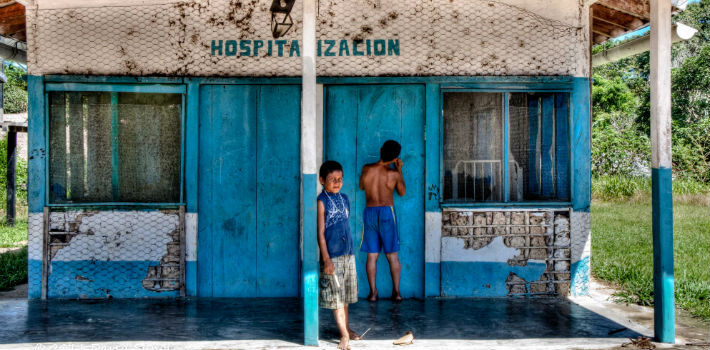
EspañolVenezuelan hospitals are in grave crisis, and the Venezuelan Society of Childcare and Pediatrics (SVPP) is sounding the alarm over vaccine shortages and the deterioration of children’s health care.
SVPP President Huníades Urbina Medina issued a statement on Thursday, July 9, expressing his concern over the “very serious situation” involving the nation’s hospitals. He says his organization has sent at least two letters on the matter to the office of Ombudsman Tarek William Saab, but have yet to receive a response.
Urbina also serves as head of the emergency department at J.M. de Los Ríos, the main public children’s hospital in the country, located in Caracas. He says the hospital itself is in a “state of emergency,” since many of the rooms are not operational. “We have not been able to treat 60 percent of the population attending J.M. de Los Ríos children’s hospital.”
According to the SVPP president, the situation has resulted in physical and verbal confrontations between desperate parents and hospital physicians. Urbina explains that people from the interior of the country travel to J.M. de Los Ríos in Caracas believing hospital conditions will be better than in their area. “But in Caracas, we are just as bad or worse than those hospitals,” he says.
Meanwhile, Eduardo Mata, a pediatrician, posted a video on social media demanding that the Venezuelan government address the health-care crisis facing the nation. According to the doctor, the situation is having a direct adverse effect on childhood development in Venezuela.
Besides the lack of vaccines for children, Mata highlights in his video message the lack of medical supplies, such as catheters, probes, suction lines, and syringes. He also says diapers and baby formula have gone missing from store shelves.
No Medicine
The PanAm Post visited 10 pharmacies in Caracas and 15 in the state of Carabobo and observed a noticeable shortage of medicine. Baby formula, contraceptive pills, saline solution, Pedialyte, sanitary towels, and infant diapers were unavailable at all 25 pharmacies.
According to Freddy Ceballos, chair of the Pharmaceutical Federation of Venezuela, “failures in medicine distribution” has reached 70 percent, and the creation of the Integral System for Medicine Access (SIAMED) has only made matters worse.
Aquiles Salas, Caracas Medical Center president, adds that there is also a shortage of other supplies like reactive agents and pacemakers. “As a doctor, one tries to step into the shoes of a patient who feels the medicines he needs are not available. That’s essentially what they’re feeling. The more serious the illness, the greater the concern,” he said.
Since early June, medical centers have been asking their patients to get their own medical supplies sent from a broad, according to a report by local daily El Nacional. Importers claim they cannot file orders overseas or gain access to credit because of the US$350 million debt the government owes to foreign suppliers.
Last month, the relatives of cancer patients held a peaceful protest in front of the University Hospital of Maracaibo, Zulia, to demand the medical supplies necessary to provide their loved ones treatment.
Death by Shortage
The ongoing shortage of medical and surgical supplies in health-care centers such as the University Hospital of Caracas could cause the Venezuelan state to face legal consequences. During the last two months of 2014, at least 1o people allegedly died due to the lack of equipment in the state hospital’s operating rooms.
Cristino García, the executive director of the Venezuelan Hospitals and Medical Centers, has said that several health organizations have begun to keep records of patients who die from lack of supplies.
“This way we will have documentation when we speak with the government about this problem that has to with the country and not the hospital. It’s important that we emphasize that the shortage of medical supplies is affecting all Venezuelans, not just a certain sector,” García said.
In April, Human Rights Watch (HRW) blamed the Venezuelan government for the health crisis in the country. According to HRW, the situation has left thousands of patients without medicine, caused long waiting lists, and threatened lives.
The NGO’s press release highlights a poll by Physicians for Health, which showed that of the 130 hospitals included in the survey, only 44 percent have an operating room in service. Furthermore, 60 percent of the medicines considered “essential” by the World Health Organization are not available in pharmacies.
 Versión Español
Versión Español












